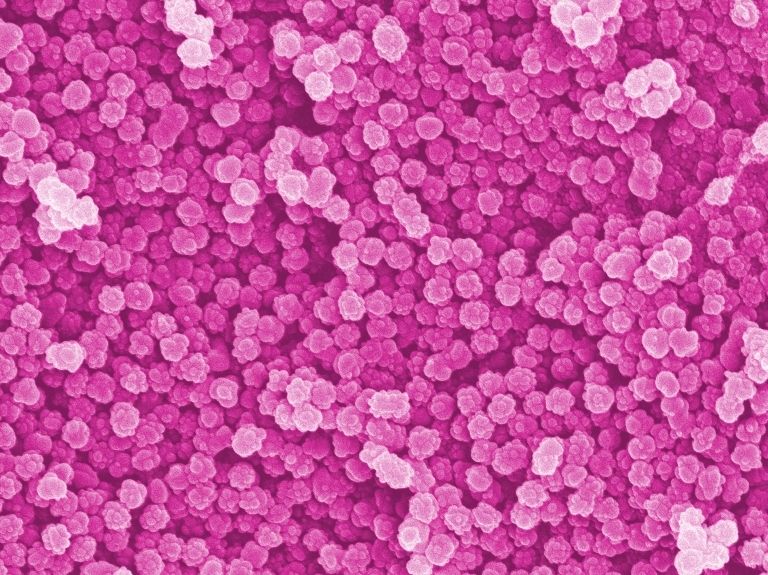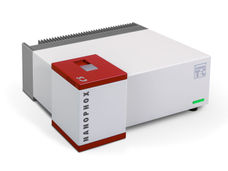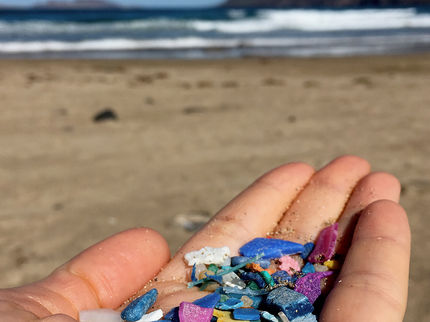Nanoplastics – an underestimated problem?
Tiny plastic particles in the environment
The images leave no one cold: giant vortices of floating plastic trash in the world's oceans with sometimes devastating consequences for their inhabitants – the sobering legacy of our modern lifestyle. Weathering and degradation processes produce countless tiny particles that can now be detected in virtually all ecosystems. But how dangerous are the smallest of them, so-called nanoplastics? Are they a ticking time bomb, as alarming media reports suggest? In the latest issue of the journal Nature Nanotechnology, a team from Empa and ETH Zurich examines the state of current knowledge – or lack thereof – and points out how these important questions should be addressed.

Nanoplastics: particles in the nanometer range (Electron microscopy image, colored, 50.000x).
Empa / ETH
Wherever scientists look, they can spot them: whether in remote mountain lakes, in Arctic sea ice, in the deep-ocean floor or in air samples, even in edible fish – thousands upon thousands of microscopic plastic particles in the micro to millimeter range. This microplastic is now even considered one of the defining features of the Anthropocene, the age of the Earth shaped by modern humans.
Microplastics are formed by weathering and physicochemical or biological degradation processes from macroscopic plastic products, such as the tons of plastic waste in the oceans. It is unlikely that these degradation processes will stop at the micrometer scale. And so there is growing concern about the potential harmful effects nanoplastics could have on various ecosystems. "Numerous media reports suggest, through their sometimes highly emotional coverage, that we are facing a huge problem here," says Empa researcher Bernd Nowack, who has long studied the material flows of synthetic micro- and nanoparticles, for example from textiles or tire abrasion, into the environment. But Nowack says at present this statement can hardly be substantiated by scientific findings: "We don't even know how much nanoplastics there is in the different ecosystems."
Huge gaps in knowledge ...
This is primarily because it is enormously difficult in terms of measurement technology to identify artificial nanoparticles made of plastic in environmental samples with thousands and thousands of (natural) particles of similar size. Appropriate analytical methods would first have to be developed, says Denise Mitrano of ETH Zurich. And then it would be a matter of understanding exactly what risk the tiny plastic particles – some of which differ considerably in their chemical composition – pose to humans and the environment, in other words: how dangerous they ultimately are. Adds Nowack, "So we can't justifiably say we have a serious problem here – but we also can't say we don't."
That's because the smaller particles become, the more likely they are to reach organs and tissues that are inaccessible to larger particles. The blood-brain barrier or placenta, for instance, prevents particles and macromolecules from passing through until they reach a certain size – or rather, smallness – thereby protecting the tissues and organs "behind" them, i.e. the brain and fetus, respectively, from potentially dangerous substances such as viruses and bacteria. "Even if we ingest microplastics, for example through our food, they probably do not enter our bloodstream or our brain, but are simply excreted again," says Peter Wick, head of Empa's Particles-Biology Interactions lab, who studies the interactions of nanoparticles with biological systems. "With nanoplastics, we can't be so sure."
... and great need for research
Because of the enormous gaps in current knowledge, research into nanoplastics must thus be intensified, conclude Mitrano, Wick and Nowack. However, this should be done as systematically and broadly as possible – and with a cool head. After all, emerging pollutants do not always turn out to be as dangerous as originally assumed. "Our society initially adopts a zero-risk attitude toward many things that are new and unknown," Wick says. And that's understandable, he adds, especially in the case of nanoplastics, because, after all, "who wants plastic in their food?"
The solution to the problem, however, is as simple (at least in theory) as it is complex. On the one hand, a large proportion of nanoplastic particles are produced by the degradation of macro- and microplastics. Less plastic in the environment, therefore, reduces the amount of nanoplastics, and here every one of us can help stop polluting the environment with plastic waste. On the other hand, nanoplastics can also be created during the use of plastic products – for example, through abrasion – without the user being able to do anything about it. Indeed, our society is hardly possible without plastic. "The various polymers simply have too many positive properties for that," says Bernd Nowack.
Original publication
Original publication
DM Mitrano, P Wick & B Nowack; "Placing nanoplastics in the context of global plastic pollution"; Nature Nanotechnology; 2021
Organizations
Other news from the department science
These products might interest you

NANOPHOX CS by Sympatec
Particle size analysis in the nano range: Analyzing high concentrations with ease
Reliable results without time-consuming sample preparation

Eclipse by Wyatt Technology
FFF-MALS system for separation and characterization of macromolecules and nanoparticles
The latest and most innovative FFF system designed for highest usability, robustness and data quality

DynaPro Plate Reader III by Wyatt Technology
Screening of biopharmaceuticals and proteins with high-throughput dynamic light scattering (DLS)
Efficiently characterize your sample quality and stability from lead discovery to quality control

Get the chemical industry in your inbox
By submitting this form you agree that LUMITOS AG will send you the newsletter(s) selected above by email. Your data will not be passed on to third parties. Your data will be stored and processed in accordance with our data protection regulations. LUMITOS may contact you by email for the purpose of advertising or market and opinion surveys. You can revoke your consent at any time without giving reasons to LUMITOS AG, Ernst-Augustin-Str. 2, 12489 Berlin, Germany or by e-mail at revoke@lumitos.com with effect for the future. In addition, each email contains a link to unsubscribe from the corresponding newsletter.
Most read news
More news from our other portals
Last viewed contents
Recycling
Category:Sugar
Allylic_rearrangement

Analytica 2020 with very good results in the digital format - Largest virtual platform of the laboratory industry
Calcium_in_biology
Regulator_of_G_protein_signalling
Category:Cardiac_hormones
Huntsman to Increase MDI and MDI-Based Systems Prices in Europe
Erbin_(protein)




























































